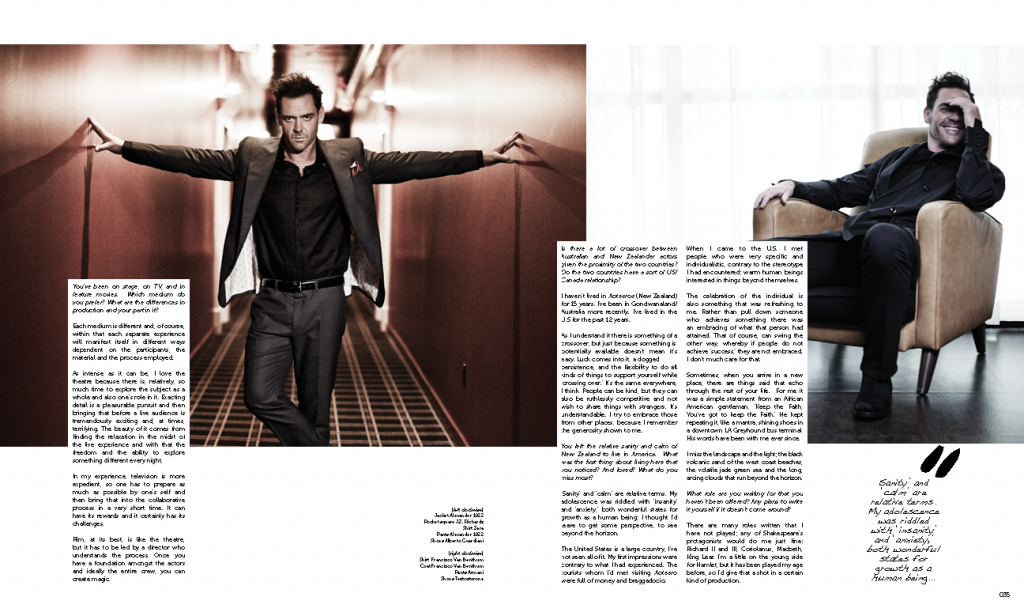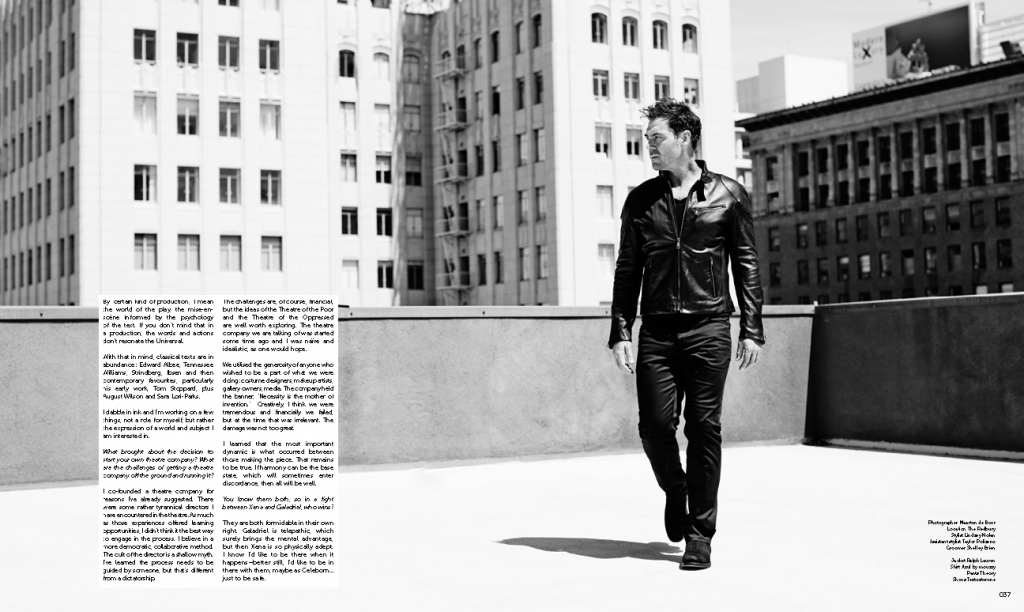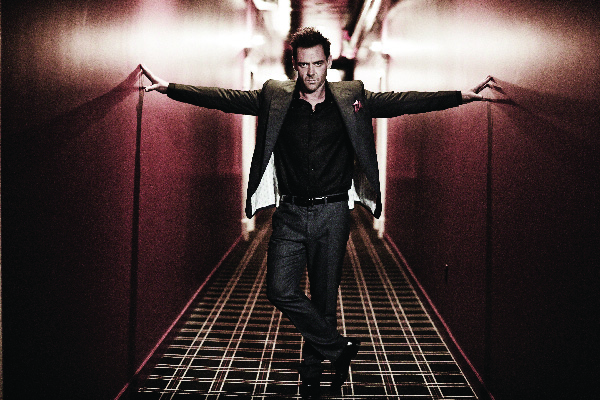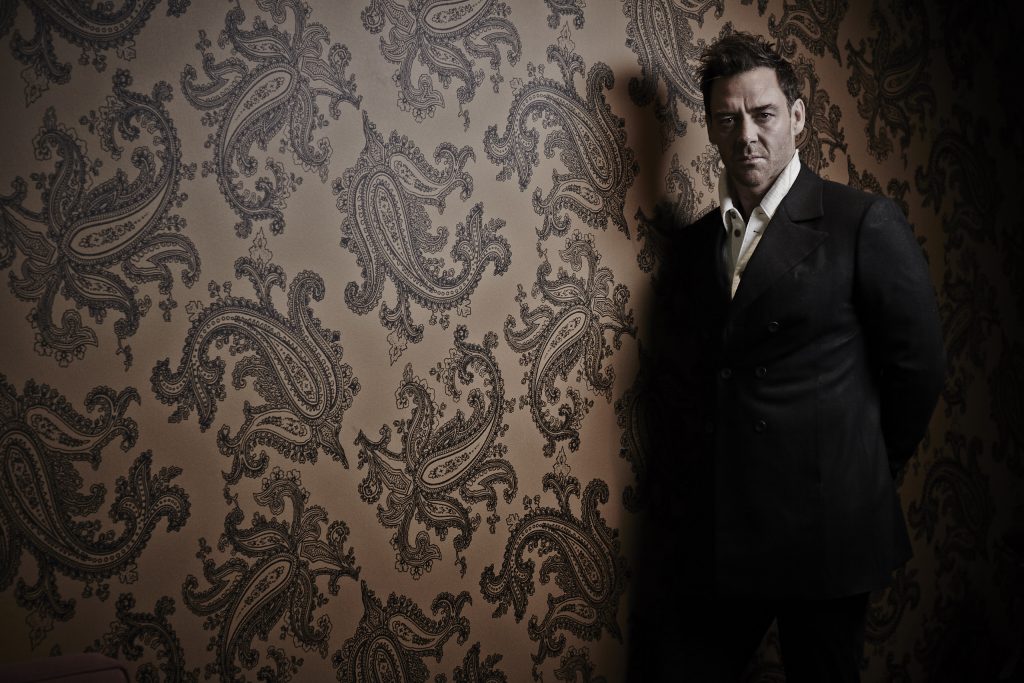


photography by Marteen de Boer
You’ve been on stage, on TV, and in feature movies. Which medium do you prefer? What are the differences in production and your part in it?
Each medium is different and, of course, within that each separate experience will manifest itself in different ways dependent on the participants, the material and the process employed.
As intense as it can be, I love the theatre because there is, relatively, so much time to explore the subject as a whole and also one’s role in it. Exacting detail is a pleasurable pursuit and then bringing that before a live audience is tremendously exciting and, at times, terrifying. The beauty of it comes from finding the relaxation in the midst of the live experience and with that the freedom and the ability to explore something different every night.
In my experience, television is more expedient, so one has to prepare as much as possible by one’s self and then bring that into the collaborative process in a very short time. It can have its rewards and it certainly has its challenges.
Film, at its best, is like the theatre, but it has to be led by a director who understands the process. Once you have a foundation amongst the actors and ideally the entire crew, you can create magic.
Is there a lot of crossover between Australian and New Zealander actors given the proximity of the two countries? Do the two countries have a sort of US/Canada relationship?
I haven’t lived in Aotearoa (New Zealand) for 15 years. I’ve been in Gondwanaland/Australia more recently. I’ve lived in the U.S for the past 12 years.

As I understand it there is something of a crossover, but just because something is
potentially available doesn’t mean it’s easy. Luck comes into it, a dogged
persistence, and the flexibility to do all kinds of things to support yourself while ‘crossing over.’ It’s the same everywhere, I think. People can be kind, but they can also be ruthlessly competitive and not wish to share things with strangers. It’s understandable. I try to embrace those from other places, because I remember the generosity shown to me.
You left the relative sanity and calm of New Zealand to live in America. What was the first thing about living here that you noticed? And loved? What do you miss most?
‘Sanity’ and ‘calm’ are relative terms. My adolescence was riddled with ‘insanity’ and ‘anxiety,’ both wonderful states for growth as a human being; I thought I’d leave to get some perspective, to see beyond the horizon.
The United States is a large country, I’ve not seen all of it. My first impressions were contrary to what I had experienced. The tourists whom I’d met visiting Aotearo were full of money and braggadocio.
When I came to the U.S. I met people who were very specific and individualistic, contrary to the stereotype I had encountered; warm human beings interested in things beyond themselves.
The celebration of the individual is also something that was refreshing to me. Rather than pull down someone who achieves something there was an embracing of what that person had attained. That of course, can swing the other way, whereby if people do not achieve ‘success,’ they are not embraced. I don’t much care for that.
Sometimes, when you arrive in a new place, there are things said that echo through the rest of your life. For me it was a simple statement from an African American gentleman, ‘Keep the Faith, You’ve got to keep the Faith.’ He kept repeating it, like a mantra, shining shoes in a downtown LA Greyhound bus terminal. His words have been with me ever since.


I miss the landscape and the light; the black volcanic sand of the west coast beaches, the volatile jade green sea and the long, arcing clouds that run beyond the horizon.
What role are you waiting for that you haven’t been offered? Any plans to write it yourself if it doesn’t come around?
There are many roles written that I have not played; any of Shakespeare’s protagonists would do me just fine: Richard II and III, Coriolanus, Macbeth, King Lear. I’m a little on the young side for Hamlet, but it has been played my age before, so I’d give that a shot in a certain kind of production.
By ‘certain kind of production,’ I mean the world of the play, the mise-en-scéne informed by the psychology of the text. If you don’t mind that in a production, the words and actions don’t resonate the Universal.
With that in mind, classical texts are in abundance: Edward Albee, Tennessee Williams, Strindberg, Ibsen and then contemporary favourites, particularly his early work, Tom Stoppard, plus August Wilson and Sara Lori-Parks.
I dabble in ink and I’m working on a few things, not a role for myself, but rather the expression of a world and subject I am interested in.


What brought about the decision to start your own theatre company? What are the challenges of getting a theatre company off the ground and running it?
I co-founded a theatre company for reasons I’ve already suggested. There were some rather tyrannical directors I have encountered in the theatre. As much as those experiences offered learning opportunities, I didn’t think it the best way to engage in the process. I believe in a more democratic, collaborative method. The cult of the director is a shallow myth. I’ve learned the process needs to be guided by someone, but that’s different from a dictatorship.
The challenges are, of course, financial, but the ideas of the Theatre of the Poor and the Theatre of the Oppressed are well worth exploring. The theatre company we are talking of was started some time ago and I was naïve and idealistic, as one would hope.
We utilised the generosity of anyone who wished to be a part of what we were doing: costume designers, makeup artists, gallery owners, media. The company held the banner, “Necessity is the mother of invention.” Creatively, I think we were tremendous and financially we failed, but at the time that was irrelevant. The damage was not too great.
I learned that the most important dynamic is what occurred between those making the piece. That remains to be true. If harmony can be the base state, which will sometimes enter discordance, then all will be well.
You know them both, so in a fight between Xena and Galadriel, who wins?
They are both formidable in their own right. Galadriel is telepathic, which surely brings the mental advantage, but then Xena is so physically adept. I know I’d like to be there when it happens—better still, I’d like to be in there with them, maybe as Celeborn…just to be safe.



1 comment
I would very much like to know what is happening with Mr. Csokas in 2016. Any new movies?
Comments are closed.